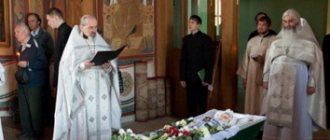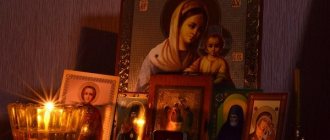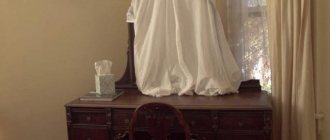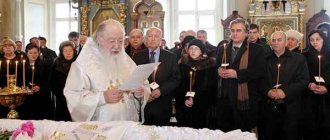The funeral of a person is a difficult event. According to ancient beliefs, the soul must complete its journey unhindered and end up in heaven. To do this, relatives perform appropriate rituals and observe many signs. One of the most important concerns mirrors and other reflective surfaces. These objects have always been endowed with magical powers; they were the gateway to the possessions of spirits. But they turn into an obstacle to the soul when a person dies. Therefore, the corresponding rules arose - to cover mirrors in the house of the deceased.
Why do mirrors close after a person's death?
The main reason is that this piece of furniture can trap souls. Instead of going to the Kingdom of Heaven, the deceased finds himself in a mirror maze. There he wanders until the end of time.
Not only the soul itself suffers, but also the family, because the energy of death accumulates in the mirror, which attracts troubles. Other relatives who were at the funeral can follow the deceased.
In addition, the mirror absorbs everything that happens in the house. The sadness and suffering caused by the loss of a loved one remains with him. Because of this property, it is recommended to periodically clean mirrors, even if death has not visited the house.
Failure to comply with signs can lead to other troubles:
- if the soul of the deceased sees its own reflection, such a sight will frighten it;
- a living person can also notice a dead person in the mirror, then the deceased relative will drag the unfortunate person along with him, causing another death;
- through this object the soul is often stolen by evil forces;
- people who grieve for the deceased are very sensitive and see strange and mystical things in reflective surfaces.
In ancient times, a belief arose that when a person dies, he does not immediately understand it. It takes another three days to realize it. It is dangerous for a confused soul to look in the mirror, because if she sees what has happened, she will be horrified. Because of this, the deceased will try to break the object, he will be angry and experience other negative emotions. All this will distract you from understanding your life actions and interfere with your transition to heaven.
According to esotericists, at the moment of death a powerful energy surge occurs. If the mirrors in the house of the deceased are not covered, then all this remains on them, as if on film. As a result, tragic events can be seen through the mirror surface years later.
How does the church view the custom?
Priests do not give a definite answer to the question of hanging mirrors after death and how many days they should be closed. Their opinion is based on the fact that there are no standard instructions for ritual in Orthodoxy.
But some temple servants advise knowing on what day after death mirrors are opened. They need to be curtained not only for the duration of the deceased’s stay in the house, but also on the ninth and fortieth days. For forty days the soul remains on earth. She does not move away from the body.
The attitude of the church to custom
The opinions of priests regarding omens vary greatly. Some believe that observing it will help the soul find peace, and therefore advise that mirrors be hung for the required period. However, others do not consider this necessary.
The custom has nothing to do with Orthodoxy, but has remained since pagan times, like many other funeral traditions. The Church does not encourage such superstitions.
However, people simply keep their mirrors closed and don't think about the origins of the rule.
This confusion arose due to a wrong attitude towards death. People perceive it as a tragedy, and to some extent it really is. Death is the result of a person ceasing to be one with God and plunging into suffering. But at the same time, it serves as liberation from the shackles of the material world. After passing away, people can reconnect with eternity and God. Therefore, death is considered not the end, but the beginning.
As a result, all memorial rites are no longer carried out for the deceased, but for his family and friends, so that they say goodbye to him. According to the church, superstitions can even be harmful in this case. In services for the deceased there are places where it is explicitly written not to cry for the deceased. Therefore, there is no need to wait a long time until the covers can be removed from the mirrors.
The emergence of tradition
Since a mirror was considered a luxury item and only wealthy people could afford it, it was perceived not as a means for contemplating oneself, but as a magical object. The situation was aggravated by the development of occult sciences, and the mirror became a central attribute in various magical rituals and fortune telling. Additionally, interest in mirrors was fueled by the disapproval of the church, since a person, admiring himself, indulges selfishness, one of the vices.
Veiling is also common among the Jews. A person in mourning should not dress up, decorate himself or apply makeup. If the mirror is closed, then temptation does not arise, and mourning severity is also emphasized. In such an atmosphere, nothing distracts you from focusing on the mountain.
Unusual phenomena associated with belief
It doesn't matter where exactly the person died. Even if after death he was not brought to his home, the mirrors are still covered, because the soul comes to say goodbye to loved ones. Otherwise, strange phenomena begin to occur:
- the mirror itself becomes cloudy, nothing can be seen in it;
- patterns and even drawings appear on the surface;
- problems with the light begin, footsteps are heard, things move and fall on their own.
All this means that the soul has not found peace and is now wandering around the house. A mirror that became covered with patterns or became cloudy was immediately destroyed and the fragments were thrown away. It was believed that this would help the dead man to free himself. In other cases, a priest is invited to cleanse the home. But even after this, strange events sometimes continue. Then you still have to get rid of the mirrors.
Antique mirrors
In the old days they were made by layer-by-layer application of mercury on glass. When dying, a person emits alpha brain waves, and the mirror absorbs the images and creates a hologram. Images are reproduced, ghosts appear.
Modern products are already produced using a different technology , less suitable for storing information. But the tradition of covering mirrors or turning them away remains.
There were cases when the mirror became cloudy after the death of a person and intricate drawings appeared on it. He was immediately destroyed. Otherwise, the spirit of the deceased could not leave the labyrinths of the looking glass.
How and what is customary to close
The ideal option for this case would be thick black fabric. But sheets, blankets, and tablecloths are also suitable. In fact, the type of fabric is not that important. The main thing is that it completely covers the mirrors and does not allow anything to be seen in them, even by accident. The color and other characteristics of the fabric are not important, but black will best protect the mirror surface from view. In addition, such fabric is more appropriate for mourning.
Reflective surfaces are curtained as soon as family members learn of the death.
But if a person was in the hospital for a long time and already said goodbye to life there, then the sign loses its power. There is no longer any risk for the soul to be captured by mirrors. If possible, cover with a cloth everything on which a reflection may appear. This includes equipment, TV and computer screens.
Other beliefs
In addition to the tradition of sealing mirrors or covering them with a blanket while the deceased is in the house, there are other signs. No need to look in mirrors in the cemetery. Since they reflect not only the obvious, but also another world, the person who looks at it will be haunted by misfortunes.
People say that a mirror that breaks during a burial in the house where the deceased was located necessarily foreshadows troubles and misfortunes. Soon they will fall on the relatives of the deceased.
The tradition of covering mirrors with cloth has passed down from pagan times and is not supported by Christianity. When to cover with a sheet and open them, each person decides for himself. Sometimes nothing bad happens, but in history there are cases when, due to uncovered mirrors during a funeral, a series of tragic events followed.
On what day after death are mirrors opened?
There are no exact dates in this case. Time varies from 9 to 40 days. It would be right if family members listen to their feelings and decide whether to remove the covers. However, nine days is the minimum period for which mirrors must be closed. It is believed that all this time the soul remains in the house and says goodbye to its relatives. After this, angels and saints escort her to heaven. Then you can open the mirrors after the death of a loved one, but first the apartment is washed.
If family members are afraid that they will see the deceased and feel anxious, they must wait 40 days. It takes so much time for a person to say goodbye to earthly life and go to heaven. Ideally, during this time, cover everything that has reflective surfaces. But in the modern world this is not easy, because people are accustomed to televisions and computers, and many need the latter for work. The desire to be distracted rather than sit in silence will also be understandable. Therefore, it is allowed to remove the fabric from the equipment early. But this definitely shouldn’t be done when the deceased himself is lying in the house.
Funeral taboo
- The coffin must be carried by strangers. Relatives are strictly prohibited from doing this. They are not allowed to walk in front of the funeral procession, nor wash the floors in the room where the deceased lay.
- Hygiene products that were used to prepare the deceased for burial are placed directly in the house or destroyed away from prying eyes.
- Drinking alcohol in a cemetery, as well as pouring vodka or other alcohol on a grave mound is unacceptable. Such actions desecrate the memory of the deceased and are considered blasphemy.
- You cannot return to the house of a deceased person after the coffin has been removed and until the end of the funeral process. Failure to comply with this sign threatens a person with health problems and even death.
- Traditionally, hygiene items, money, handkerchiefs and other accessories are placed in the coffin with the deceased, which he can use for its intended purpose in the afterlife.
- It is not advisable for pregnant women to attend a funeral ceremony, since the unfavorable energy and atmosphere of the cemetery have an extremely negative impact on the fetus.
Other signs about mirrors and funerals
It is considered wrong and indecent to look at any mirror surfaces during mourning. And it’s not just about the soul that wanders nearby:
- If a grieving person looks at his reflection, his sadness will double. He won't recover from it any time soon.
- According to one legend, Satan created the mirror to make people proud of themselves. Narcissism will be disrespect for the deceased and family, a manifestation of selfishness.
- You cannot watch after the funeral service for the deceased, it will lead to death. If a person accidentally does this, he should force the cat to look in the mirror. She will give one of her nine lives.
- While mourning continues, the boundary between the world of the living and the dead weakens. Evil spirits seek to enter the house and harm those living there.
Until forty days have passed, it is better not to touch the mirrors at all. There is a risk of breaking one of them through negligence, and this will cause trouble or even the death of another person.
Many people do not approve of such superstitions, but family members are still afraid to see the reflection of the deceased. Mirrors seem mystical and scary to just leave them in sight. It is easier to cover the reflective surface so as not to aggravate the grief and fears. In addition, this will protect the deceased and remove obstacles on the way to another world.
Where did the tradition of hanging a mirror in the house of the deceased come from?
This custom has two origins.
Firstly, mirrors have long been an object of status and were perceived not from a practical, but from a magical side. In the 19th century, a fashion for the occult appeared and quickly spread among the wealthy strata of society. Mirrors then became an important attribute of witchcraft and fortune telling. There was also a pleasant rebellious note in the use of mirrors: a number of clergy condemned the use of mirrors as such, since narcissism in the mirror indulged the vice of selfishness.
Second, covering mirrors is part of proper Jewish mourning. In Judaism, if a person is in mourning, then he cannot perform skincare procedures, use cosmetics, or wear beautiful clothes. Curtaining the mirrors, in this case, emphasizes the severity of mourning. If the mirror is curtained, then there is no temptation to look into it and “make a mess.” This helps you focus on grieving for the deceased, rather than on your appearance.
Question-answer section
Should mirrors be covered if a person dies not at home?
Expert opinion Remontnikov Vladimir Petrovich Religious scholar, historian
You should not become attached to the physical shell. It can be anywhere, but the soul strives for its native places: home, to close people. For this reason, it is customary to cover mirrored objects regardless of where the person’s death occurred. For the first 3 days, the incorporeal shell will visit its home and other familiar places, and therefore reflective surfaces must be covered.
What happens if the mirror opens?
Expert opinion Remontnikov Vladimir Petrovich Religious scholar, historian
If the cover is not secured securely enough, it may fall. Outwardly nothing will happen, but no one can know whether during this period of time the deadly energy will have time to be imprinted on the reflective object. It is better to invite a clergyman to clean the room after this.
Cleaning the house
Do I need to cover the TV and glass surfaces?
Expert opinion Remontnikov Vladimir Petrovich Religious scholar, historian
Few people know why mirrors are covered and why they only cover them after the death of a loved one. But it’s better to play it safe, which is why the surface of the monitor and computer is also protected.
Should mirrors be covered when a person dies in a hospital?
Expert opinion Remontnikov Vladimir Petrovich Religious scholar, historian
Ancestors covered mirrors regardless of where a person died. This could be a hospital, a sidewalk outside, etc. Still, cover reflective surfaces in your home. A hospital is a public place where people often die; there are no such traditions here. This is the privilege of relatives at home, where the deceased previously lived. It is imperative to protect yourself and your loved ones, because centuries-old traditions could not form out of nowhere.
Why do they cover the mirrors of the deceased in the house before the funeral?
Expert opinion Remontnikov Vladimir Petrovich Religious scholar, historian
If a person hung mirrors after a funeral, this is a grave mistake, because the veil will not be useful, it simply became useless - it was hung too late. Protect reflective surfaces as soon as news of death is received. But this is not always possible, and therefore it is additionally recommended to clean the mirrors.
The mirror remains closed for up to 40 days
Is it necessary to cover mirrors if the deceased is not in the house, but is being embalmed in the morgue?
Expert opinion Remontnikov Vladimir Petrovich Religious scholar, historian
Death is the starting point of the soul's journey. From this moment they begin to perform all the necessary rituals and count down the days for the funeral. Even if the deceased was taken to the morgue, the incorruptible shell may remain next to the body, visit relatives, or end up home.
The imperishable shell knows nothing about what is happening and tries to get used to the new form. Embalming is a procedure performed on a body after death. At this very time, the soul visits different places, and is not necessarily located next to the physical shell. This means that the mirrors are covered, despite the absence of the deceased at home.
Scientific point of view
Periodically, attempts are made to provide a scientific explanation of the relationship between reflective surfaces and the need to cover them after a person’s death. But there are no theories about this yet. There is no evidence that mirrors are harmful to the unprotected soul or living people. It is assumed that fear is due to centuries-old traditions and beliefs.
Draped mirrors
What are superstitious signs?
Signs can be: individual, superstition, weather. Superstitions have always been questioned and kept people in prejudice. A certain sequence of events has formed a pattern that occurs frequently. But many are still trying to comply with them:
It is not advisable to walk under a ladder; in the old days, the ladder was used to secure the gallows rope. If salt spills, it means a quarrel. After this, you should throw a pinch of salt over your left shoulder. You cannot open an umbrella at home. Legend has it that one prince received an umbrella as a gift, opened it at home and died. Looking into a broken mirror means suffering bad luck for 7 years. People associate these home attributes with the other world. Seeing yourself in a damaged mirror means trouble. Why store broken glass products? It's better to throw them in the trash.
Unexplained true stories
Despite the lack of scientific evidence to support people's fears associated with covering mirrors, inexplicable events periodically occur. For example, small children see deceased relatives in mirrors, and then it turns out that at the time of their death the reflective surfaces were left uncovered. In other cases, mirrors fall without visible damage to the mounting. There is also an inexplicable cold emanating from the surface. Stories like these confirm the connection between the otherworldly and earthly worlds through reflective surfaces.
When can you turn on the TV after a funeral?
The ban on watching TV programs does not have a mystical background; rather, it is related to ethical principles. You shouldn't turn on the TV as a tribute to a person who has passed away. It is better to mourn him, devote time to prayers, making the end of his earthly journey easier for his soul. Entertainment television shows and entertainment programs should not be watched until nine days after the death of the person. Out of respect for his memory, don't turn up the volume too much.
You can watch the news before 9 days have passed.











